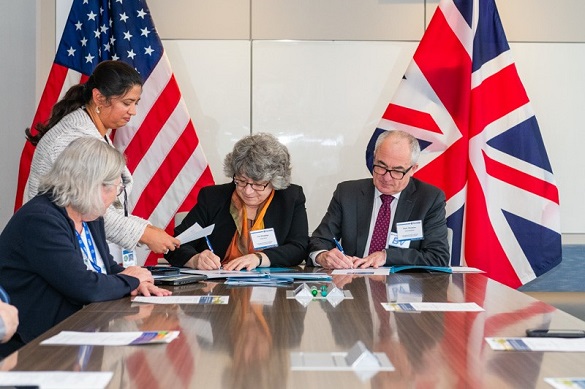
Photo: Ryan Postel, Fermilab
The University of Liverpool has formally joined The Matter-wave Atomic Gradiometer Interferometric Sensor (MAGIS-100) experiment which is led by, and currently under construction at the US Department of Energy’s Fermi National Accelerator Laboratory (Fermilab).
The University is one of four UK universities, supported by the Science and Technology Facilities Council (STFC), to join the experiment which will advance pioneering research into physics’ biggest questions.
Liverpool, alongside Imperial College London, the University of Cambridge and the University of Oxford, will provide vital expertise and support to help the experiment probe the mysteries of quantum physics, dark matter and more.
Ingenious research methods
MAGIS-100 is an ‘atom interferometry experiment’ that will be mounted in a vertical access shaft at Fermilab. Scientists will cool strontium atoms to close to absolute zero temperature and drop them down a 100-meter-long vacuum tube where they will pass through laser light that will cause them to move at two different velocities simultaneously.
The team will then measure and compare signals from the atoms to examine things such as atomic superpositions and deviations that could be caused by elusive dark-matter particles interacting with the atoms.
Scientists hope that the research will also lay the foundation for future gravitational wave detectors and research by pioneering advanced sensor technology.
Professor Joost Vossebeld, Head of Particle Physics at the University of Liverpool, said: “The agreement signed on behalf of the University by Professor Jon Coleman, is the culmination of several years of development work Jon carried out in Liverpool. Jon established an the Liverpool Atom Interferometry lab and team, where he developed some of the technologies Liverpool will now provide to the MAGIS experiment.
“With colleagues in the US, Jon was one of the founding members of the MAGIS experiment at FNAL. It is thrilling to now see these efforts move towards the full implementation of the experiment.”
Dr Lia Merminga, Director of Fermilab, said: “It is exciting to see us expand our long and celebrated partnerships with UK institutions to new scientific domains, with the highly innovative MAGIS-100 experiment
“Our UK partners participate in the design, construction and delivery of the detection system for the interferometer and will also participate in the commissioning and data analysis of the experiment.
Liverpool through working on the Atom Interferometer Observatory and Network (AION), a flagship UK initiative to use cold-atom interferometry for fundamental science, has been involved in MAGIS-100 from the beginning.
Mark Thomson, Executive Chair of STFC, said: “This initiative is an exciting opportunity, both for the U.K. and the U.S., to collaborate in new technologies for fundamental science.
“There is huge potential in applying quantum technologies to our scientific mission to uncover the secrets of the universe.”
Individuals from eight organizations participated in-person or remotely in a ceremony at Fermilab for the signing of the international cooperative research and development agreement between Fermilab and U.K. institutions,
Image caption: Fermilab Director Lia Merminga and Mark Thomson, executive chair of the Science and Technology Facilities Council, UK Research and Innovation, sign a certificate to commemorate the international cooperative research and development agreement.